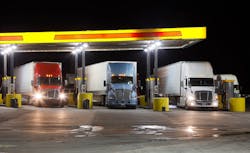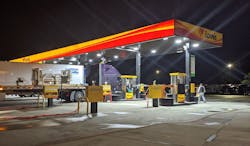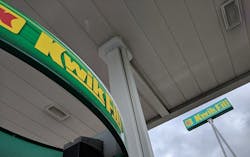To defeat COVID-19, the buck stops at truck stops
With the catastrophic outbreak of COVID-19 and subsequent rush to stock up for a nationwide quarantine of unknown length, America’s truck drivers are getting recognized for their service to the country as they traverse interstates and country roads to supply pharmacies and grocery stores in every corner of the country. Even with HOS regulations relaxed during the crisis, truckers still need to stop and refuel their tanks and recharge their bodies, making truck stops all the more critical during the pandemic.
It’s also critical that these highway oases maintain the highest level of cleanliness, as truckers from infected areas are most assuredly stopping by, increasing the risk that the coronavirus does not hitch a ride to new communities.
The easiest way to defend against this is the standard wash and sanitize hands and maintain a safe distance from others. But the insidious coronavirus latches onto any surface, staying on cardboard for a day, stainless steel for two and plastic for three days, according to the New England Journal of Medicine. Deploying agents such as diluted bleach solution and disinfectant sprays will kill the spores on contact, meaning that the most important preventative maintenance (hopefully) going on at truck stops right now is the cleaning regiment. They are the link in the pandemic’s supply chain that must be wholly severed.
The faster the spread is contained, the faster the country can get back to work and resuscitate a lifeless economy.
How seriously are truck stops taking this role? For all our sake’s, the answer better be “very.” The federal government has also listed them as essential.
We don’t know for sure, (and if you see anything fishy, email us so we can investigate), but here the actions major action some of the top truck stop chains have done so far:
Love’s Travel Stops & Country Stores
A happy worker is a productive worker, and the ubiquitous Oklahoma City-based chain has a novel approach to the virus to keep their employees happy: pay them more.
Through at least May 1, all hourly workers at Love’s, SpeedCo and Love’s Truck Care locations will earn $2 more per hour, get free meals during their shift and receive a one-time $100 bonus to be paid March 30. Salaried managers automatically get their Q1 bonus a month early, regardless of if they met performance goals.
Workers putting their health at risk simply by being out also need to be confident that if some nomadic germ worms its way into their respiratory system, the company has their back. If an employee tests positive for COVID-19 or is quarantined by a doctor, they will receive up 80 hours of paid sick time
“Unprecedented times means unprecedented measures and that’s what Love’s is doing as a company,” said Shane Wharton, president of Love’s. “The fantastic work of our store teams deserves to be rewarded. It is our mission to serve those professional drivers who are a part of getting America’s vital goods, including medical and food supplies, delivered throughout the country.”
Love’s, which has 510 locations in 41 states, increased the number of hand sanitizing stations and briefed employees on proper COVID-19 guidelines per the CDC. Drivers can limit contact by paying at the pump and/or get receipts via the Love’s Mobile Pay app. Private showers are also still available.
Open produce has been removed and all self-service roller grills, coffee and drink bars and delis to full-service to ensure only food service workers practicing proper sanitation routines (swapping out tongs and fountain nozzles every 30 minutes) handle your food.
Facilities with three restaurants will shut one down with workers sliding over to open ones to enhance cleaning.
The Pilot Company has created a COVID-19 response page, and on it asserts it “is doing everything possible to keep drivers safe and healthy, while also ensuring they’re able to move goods from point A to point B on time.” All 780 locations are open, as are fueling stations, showers, laundry and restrooms.
Drivers who want to limit contact with high-traffic surfaces, such as pin pads, can download the Pilot Flying J app. They can also reserve showers and get digital receipts this way. For drink refills, a new disposable clean cup must be used to transfer to the customer’s mug.
Food service is available for carry out, with dining rooms closed and self-service items such as hot dogs removed. Workers are following state and federal mandates social distancing. Pilot store employees are encouraged to self-report any possible symptoms to management and will be supported by an emergency paid sick leave policy.
“We are here for you and want to work alongside you during this difficult season in our country. Thank you again for all you and your drivers are doing to keep our economy and country strong,” the company concluded on the page.
Using guidance from the CDC and the World Health Organization, TravelCenters of America Inc. intends to keep as many services operating as normal, including RoadSquad 24-Hour Roadside Assistance if you’re stuck on the road and showers cleaned with the “highest quality chemicals” to wash the road off you.
The restaurant situation depends on the state, with some dining rooms open capped at 50% occupancy, while other completely closed. Online ordering for carryout is a good way to reduce time around strangers who could be infected. Obviously, buffets and salad bars are a no-go as well.
This chain makes it a point to mention all the areas and surfaces employees clean and/or sanitize: showers, restrooms, registers, door knobs, tables, menus, chairs, booths, counters, and all dishes, utensils and cooking surfaces.
The travel center network has also implemented incentives for its 21,000 employees, including guaranteed Q1 bonuses for field managers, cash bonuses for field workers, free meals and 80 hours of paid sick time for those diagnosed with COVID-19.
“We are fortunate to have such passionate employees who are committed to the millions of professional drivers hauling crucial supplies around the nation right now,” said Jon Pertchik, CEO of TA. “We are so grateful for the sacrifice and dedication of our valued team working hard so that we can remain open for the drivers who are relying on us.”
This midwestern roadside refuge, which boasts 600 locations, posted that stores clean bathrooms every hour and have reallocated workers to focus more on cleaning efforts. Along with banning refillable mug use (again just use a disposable cup as an intermediary), the chain encourages the use of hand sanitizers placed at each pump and in the store.
The company is also hiring 2,000 workers for jobs in the stores, as well as for the production, distribution and transportation divisions.
Comprising more than 300 independent truck stops, this network simply states that all locations are open for fueling and in most states, restaurants are closed.
An online post for franchisees encourages sick employees to stay home and advises hiring additional staff. It also identifies “hidden germ traps,” such as keyboards, cellphones, anything in the break room, money, the ATM, soap dispensers, pumps and door handles.
Staff should be armed with disinfecting wipes and use them liberally while shelves should be stocked with common items associated with fighting illness, from latex gloves and face masks to Vitamin C and Zinc, the message continues.
The company concludes with stressing the need to “promote a culture of tolerance and friendliness in the wake of a stressful situation. Corona beer jokes could be taken out of context and there have been instances of stereotyping, not good for business.”
This is good advice for everyone on the road, as no one needs their day made worse by hearing a joke about a virus that just impacted their family, or given suspicious looks because of their ethnicity.
So here’s one final piece of advice: Treat every public surface with extreme caution, and treat every person with extreme compassion (at a safe distance, of course).
About the Author
John Hitch
Editor
John Hitch is the editor-in-chief of Fleet Maintenance, providing maintenance management and technicians with the the latest information on the tools and strategies to keep their fleets' commercial vehicles moving. He is based out of Cleveland, Ohio, and was previously senior editor for FleetOwner. He previously wrote about manufacturing and advanced technology for IndustryWeek and New Equipment Digest.



